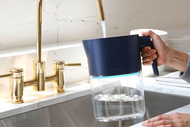Water filtration is one of my favorite things to help people with. I love great tasting fresh water and it’s a lot more straight forward than people make it out to be. I always like starting with a few simply questions to figure out what kind of water filtration system would make the most sense. Are you looking to improve how your tap water tastes, maybe it has a slight chlorine taste or even a metallic taste? Are you concerned about contaminants in your water and want to make sure you are drinking the best water possible? Are you a bit of a foodie or a coffee snob like me, and you just want to be certain that you are using the purest water to be able to achieve the best possible results when cooking or making coffee and tea. If the answer is yes to any of these questions, that is more than enough of a reason to utilize a water filter. The “is it worth getting a water filtration system” is honestly easy to answer.
I am going to focus on the EWS SS-2.5 filters and home system. But I have more information on the Everpure H-300 in our straight forward water filtration post. Both systems are great at removing contaminants from water and are easy to install. For my money, I prefer Environmental Water Systems SS-2.5 Essential Max Flow Drinking Water System. The higher flow rate is a big deal for me because it means I can use it directly with my kitchen faucet. As for what is the best home water filtration system for you will depend on your needs. We always recommend getting your water tested to make sure you are choosing the right solution.
Environmental Water Systems SS-2.5 Essential Max Flow Drinking Water System
- Environmental Water Systems SS-2.5 Essential Max Flow Drinking Water System is a water filtration system designed to provide high-quality drinking water.The SS-2.5 Essential Max Flow system uses a multi-stage filtration process to get rid of a wide range of contaminants. It incorporates activated carbon block filters and sediment filters.
- The "Max Flow" feature in this system allows for a higher flow rate compared to standard drinking water systems. This means you can connect it directly to your kitchen faucet’s cold water supply line, not adding an additional filtered water dispenser next to your kitchen sink. It provides up to 2.5 gallons per minute (GPM), ensuring fast and continuous supply of filtered water.
- Approximate 1 Year filter life - Environmental Water Systems F.SET.SS-2.5 Max Flow Filter Replacement has a filter service life is based on your local water conditions and usage(average usage varies). Fine sediment, micro-plastics, or certain water conditions may prematurely reduce flow rate and service life due to the filter's advanced ability to capture contaminants and may require more frequent filter replacements.
- The Environmental Water Systems SS-2.5 Essential Max Flow Drinking Water System is NSF/ANSI Standard 42 and 53 certified. This means it has been independently tested and verified to meet specific performance and safety standards for contaminant reduction. NSF Certification is always reassuring to see on a product.
- SS-2.5 Essential Max Flow Drinking Water System usually comes with a warranty, covering manufacturing defects and providing customer support.
If you're thinking about filtering your water, there are a few things you'll need to do to get started. There are many different types of water filters available, so it's important to choose one that's right for your needs. When deciding to filter your water, there are several factors to consider. Here are some steps you can follow to help you make an informed decision:
Test water source: Start by learning about the quality of your tap water. Contact your local water utility or check their website to access information on the source of your water, any contaminants detected, and water quality reports. This will give you an idea of what you might need to filter out.
Identify specific concerns: Determine your specific water concerns or the contaminants you want to remove. Common issues include chlorine, heavy metals, pesticides, bacteria, viruses, or sediment. Understanding your concerns will help you choose the right filtration method.
Consider certified products: Look for water filtration products that have been certified by reputable organizations such as NSF International or the Water Quality Association (WQA). Certification ensures that the product meets specific standards and has been tested for performance and safety.
Assess your budget: Consider your budget for purchasing and maintaining a water filtration system. Some methods may require upfront costs for installation, while others might need ongoing filter replacements or maintenance expenses. Factor in the long-term costs when making your decision.
Seek professional advice: If you're uncertain about the quality of your water or the appropriate filtration method, consider consulting a water treatment professional. They can assess your water, provide personalized recommendations, and help you choose the most suitable filtration system for your needs.
If you have any questions please contact us.






